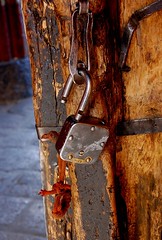Justified Discipline
If a teacher irresponsibly publishes text or other media online, he/she may be disciplined. As described in the Dian Schaffhauser (2008) article, “Suspended Teacher Incident Ignites Debate: Should Online Privacy for Educators Exist?,” the unidentified teacher cited ignorance of settings as her justification for posting a racially offensive statement on Facebook. This is ridiculous, since the excuse of, “But, I didn’t know” is unacceptable even in a kindergarten classroom. Even if the teacher had posted her statement to be viewed by only a select group of people, it could still be captured and shared by a screenshot. By choosing to publish online, this teacher and all others are responsible for the potential outcomes of their decisions.
Educators' Responsibility
Educators are completely responsible for their behaviors regardless of whether or not they are shared online. Teachers who create inappropriate online content may be disciplined by a school district for violating human resources policies, Education Code, and/or creating a disruption to the school day. In Tinker v. Des Moines Independent Community School District (1969), the US Supreme Court ruled that teachers and students’ rights to freedom of speech may be limited if they cause a substantial disruption to the learning environment. Publishing online increases the ease by which a comment or picture can become a disruption, since it can be easily shared.
Online Privacy
The concept of online privacy is a grey area. Students and teachers are able to limit viewer access to many online social networking sites, but this only limits who can view their content. They cannot control what these viewers do with their content or the privacy regulations of the host site. For example, one of my students may post a very revealing self-portrait within a private folder of her Facebook profile. However, one of her friends with access to the folder may copy the photo to repost on his profile making it completely public. Instead of simply expecting teachers and students to use privacy settings online, it is more important to teach them to refrain from posting any embarrassing or inappropriate text or media.
Separation of Networks
Within most social networks, it is very easy to regulate who can view users’ profiles. Within most popular social networking sites, profiles can be set as completely private or can limit the amounts of information different groups or individual users can access. Using these settings, it is simple to separate professional and personal profiles. However, it is more important to focus on a teacher’s larger online footprint. For example, my Facebook settings block my current students and alumni from viewing my photos and status updates. But, a quick Google search of my name will quickly reveal that I have spoken against teacher layoffs, attended Treasure Trails as a child, and emceed events for Girl Scouts. I cannot control the privacy settings of school board minutes, local archives, and newspaper articles. But, I do not mind these publications, since they are mixed within pages of links to my educational online content, such as Prezis and blogs. Besides, sharing these parts of my life make me a real person which helps to foster an authentic learning environment.
Resources
Photo: Lock, Tibet, Originally uploaded
by 星翼star_trooper
Schaffhauser, D. (n.d.). Suspended Teacher in Facebook Incident Ignites Debate: Should Online Privacy for Educators Exist?. THE Journal: Technological Horizons in Education. Retrieved July 29, 2010, from http://thejournal.com/articles/2008/11/19/suspended-teacher-in-facebook-incident-ignites-debate-should-online-privacy-for-educators-exist.aspx

No comments:
Post a Comment